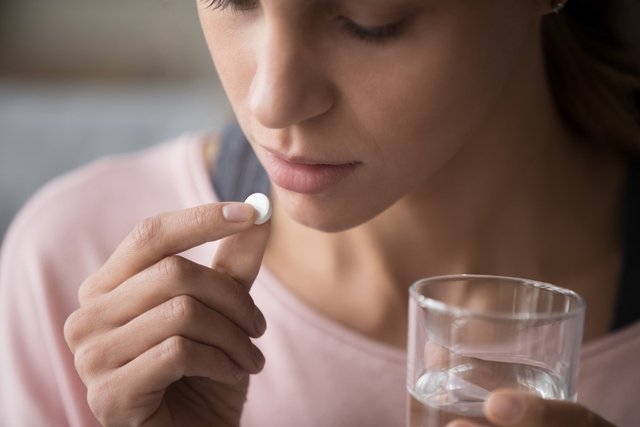Ivermectin is an antiparasitic medicine that works by paralyzing and promoting the elimination of various types of parasites. It is mainly indicated for the treatment of onchocerciasis, elephantiasis, lice, roundworm and scabies.
This medication is recommended for adults and children over 5 years of age and can be found in pharmacies in the form of tablets. Dosing varies depending on the infection being treated and body weight.
Ivermectin can also be found in the form of a cream, which is prescribed for the treatment of rosacea in adults. This medication should be taken as prescribed by a dermatologist.

Common uses
Ivermectin is indicated for the treatment of:
- Intestinal strongyloidiasis, which is an infection caused by the parasite Strongyloides stercoralis;
- Filariasis, popularly known as elephantiasis;
- Scabies
- Roundworm, which is infection by the parasite Ascaris lumbricoides;
- Pediculosis, which is an infestation with lice;
- Onchocerciasis, popularly known as "river blindness".
Furthermore, ivermectin in the form of a dermatological cream may be indicated for the treatment of rosacea in adults.
How to take
The way to use ivermectin varies depending on the condition being treated.
1. Ivermectin 6 mg tablets
The ivermectin tablet should be taken with water, on an empty stomach, preferably about 1 hour before the first meal of the day.
Ivermectin is normally taken as a single dose. The number of tablets taken vary depending on the person's weight and the disease being treated.
Strongyloidiasis, filariasis, roundworm, scabies and pediculosis
To treat strongyloidiasis, filariasis, roundworm, lice or scabies, the recommended dose of ivermectin is:
For people weighing 80 kg or more, the recommended dose of ivermectin is 200 mcg for each kg of body weight, which is equivalent to approximately 2 ½ tablets of ivermectin.
Onchocerciasis
To treat river blindness, the recommended dose based on weight is as follows:
The recommended dose for people weighing 85 kg or more is 150 mcg for each kg of body weight, which is equivalent to approximately 2 ivermectin tablets.
It is important that stool or blood tests are carried out 2 weeks after starting treatment to determine whether treatment was effective or if further treatment is needed.
In general, antiparasitics can be used once every 6 months, as frequent use of this type of medication within short intervals, can increase the risk of adverse effects and drug-induced hepatitis.
2. Ivermectin cream 10 mg/g
Ivermectin topial cream 10 mg/g is indicated for the treatment of rosacea in adults, as it reduces skin inflammation and relieves facial redness.
The recommended dosage of ivermectin cream for rosacea in adults is 1 application per day, preferably at night, applying a pea-size amount to each area of the face, such as cheeks, forehead, nose and chin. Wash your hands after application.
Ivermectin should only be applied to the face for up to 12 weeks of treatment, as prescribed by the dermatologist.
Possible side effects
Some of the most common side effects that may occur during treatment with ivermectin are diarrhea, nausea, vomiting, generalized weakness, lack of energy, abdominal pain, loss of appetite or constipation. These reactions are generally mild and short-lived.
Allergic reactions may also occur, especially when taking ivermectin for onchocerciasis. This may present as abdominal pain, fever, itching all over the body, red spots on the skin, swelling in the eyes or eyelids and conjunctivitis.
If symptoms of allergic reactions appear, discontinue the medication immediately and seek urgent medical help or proceed to the nearest emergency room.
Can Ivermectin cause medicinal hepatitis?
Medication leaflets for ivermectin does not mention any serious side effects related to liver problems nor drug-induced hepatitis, however it is known that this medication can increase liver enzyme levels.
This medicine is only indicated in acute cases for short-term treatment. Taking this medication in high doses or for prolonged periods has not been studied, and the effects are unknown.
It is possible that prolonged, very frequent use or in doses higher than those indicated may cause liver problems, including drug-induced hepatitis. Ideally, you should only take ivermectin as prescribed by a doctor.
Contraindications for use
This medication is contraindicated for pregnant women, women who are breastfeeding, children under 5 years old, children weighing less than 15 kg and people with meningitis or asthma.
It should also not be used in people who are allergic to ivermectin or any other of the components present in the formula.
Ivermectin is contraindicated for people using barbiturates, benzodiazepines, valproic acid or sodium oxybate.
